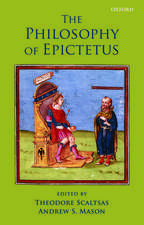Behemoth or The Long Parliament
Autor Thomas Hobbesen Limba Engleză Paperback – 15 aug 1990
Behemoth, or The Long Parliament is essential to any reader interested in the historical context of the thought of Thomas Hobbes (1588-1679). In De Cive (1642) and Leviathan (1651), the great political philosopher had developed an analytical framework for discussing sedition, rebellion, and the breakdown of authority. Behemoth, completed around 1668 and not published until after Hobbe's death, represents the systematic application of this framework to the English Civil War.
In his insightful and substantial Introduction, Stephen Holmes examines the major themes and implications of Behemoth in Hobbes's system of thought. Holmes notes that a fresh consideration of Behemoth dispels persistent misreadings of Hobbes, including the idea that man is motivated solely by a desire for self-preservation. Behemoth, which is cast as a series of dialogues between a teacher and his pupil, locates the principal cause of the Civil War less in economic interests than in the stubborn irrationality of key actors. It also shows more vividly than any of Hobbe's other works the importance of religion in his theories of human nature and behavior.
In his insightful and substantial Introduction, Stephen Holmes examines the major themes and implications of Behemoth in Hobbes's system of thought. Holmes notes that a fresh consideration of Behemoth dispels persistent misreadings of Hobbes, including the idea that man is motivated solely by a desire for self-preservation. Behemoth, which is cast as a series of dialogues between a teacher and his pupil, locates the principal cause of the Civil War less in economic interests than in the stubborn irrationality of key actors. It also shows more vividly than any of Hobbe's other works the importance of religion in his theories of human nature and behavior.
Preț: 264.16 lei
Nou
Puncte Express: 396
Preț estimativ în valută:
50.55€ • 52.92$ • 41.82£
50.55€ • 52.92$ • 41.82£
Carte tipărită la comandă
Livrare economică 05-19 aprilie
Preluare comenzi: 021 569.72.76
Specificații
ISBN-13: 9780226345444
ISBN-10: 0226345440
Pagini: 212
Dimensiuni: 140 x 213 x 18 mm
Greutate: 0.31 kg
Ediția:1
Editura: University of Chicago Press
Colecția University of Chicago Press
ISBN-10: 0226345440
Pagini: 212
Dimensiuni: 140 x 213 x 18 mm
Greutate: 0.31 kg
Ediția:1
Editura: University of Chicago Press
Colecția University of Chicago Press
Public țintă
Academic/professional/technical: Undergraduate. Academic/professional/technical: Postgraduate. Academic/professional/technical: Research and professionalNotă biografică
Stephen Holmes, a professor of political science and law at the University of Chicago, is the author of Benjamin Constant and the Making of Modern Liberalism.
Cuprins
Dialogue I
Dialogue II
Dialogue III
Dialogue IV
Dialogue II
Dialogue III
Dialogue IV














